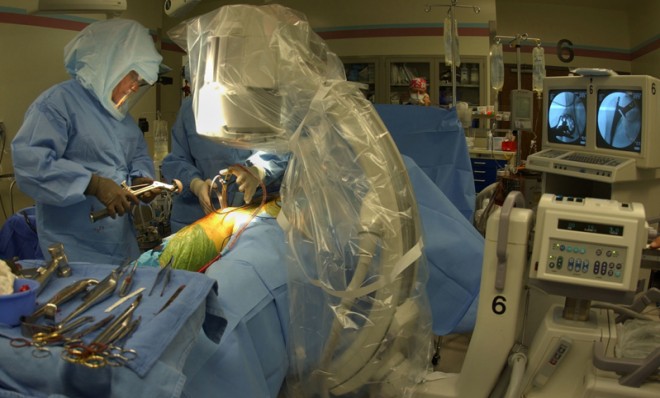Why a joint replacement costs $30,000 in one hospital and $160,000 in another
New data reveals just how dysfunctional America's healthcare system is

A free daily email with the biggest news stories of the day – and the best features from TheWeek.com
You are now subscribed
Your newsletter sign-up was successful
If you need a lower joint replacement, Sibley Memorial Hospital in Washington D.C. will charge you or your insurance provider an average of $30,000, according to The Washington Post. Across town at George Washington University, the same procedure will cost $69,000. And at Las Colinas Medical Center near Dallas? $160,832.
Those bewildering price differences were revealed by the Obama administration to reporters at The Washington Post, New York Times and Huffington Post. They represent what different hospitals charge Medicare for the exact same procedures — information the government has been collecting for years but was previously only available to researchers for a high fee.
Why is there such a wild disparity between prices? Because hospitals don't have much of an incentive to keep them low. They can essentially charge whatever they want.
The Week
Escape your echo chamber. Get the facts behind the news, plus analysis from multiple perspectives.

Sign up for The Week's Free Newsletters
From our morning news briefing to a weekly Good News Newsletter, get the best of The Week delivered directly to your inbox.
From our morning news briefing to a weekly Good News Newsletter, get the best of The Week delivered directly to your inbox.
Now, most Americans don't actually see or pay the eye-popping amounts that hospitals charge for procedures. Medicare, for instance, reimburses hospitals with standardized amounts for each treatment, regardless of what the hospital actually bills, notes The New York Times. And private health insurance companies negotiate the price of each procedure with every hospital.
That seems to give patients with Medicare or private insurance little reason to care what hospitals are charging. But if you are one of the 49 million Americans without insurance, the numbers matter a whole lot — because you have to pay full price. Ron Pollack, executive director of health consumer advocacy group Families USA, argued to Bloomberg Businessweek that the system is dysfunctional:
Hospital pricing is the craziest of crazy quilts. Most absurdly, the people who wind up paying the highest prices are people who are uninsured and who can least afford bearing this unaffordable burden. [Bloomberg Businessweek]
Hospitals counter that people rarely pay the amount listed on the chargemaster, a database every hospital comes up with that lists the price of every procedure.
"The chargemaster can be confusing because it's highly variable and generally not what a consumer would pay," Carol Steinberg, vice president at the American Hospital Association, told The Washington Post. "Even an uninsured person isn't always paying the chargemaster rate."
A free daily email with the biggest news stories of the day – and the best features from TheWeek.com
Some of the price differentials between hospitals can be chalked up to variable costs. After all, some hospitals do have higher overhead than others, especially a facility that serves a low-income population or that provides training to medical students. Those factors, however, don't explain some of the more wild variations, especially when hospitals are located in the same city. According to The Huffington Post, treatment for pneumonia in the Los Angeles area varies by $100,000.
"Our purpose for posting this information is to shine a much stronger light on these practices," Jonathan Blum, director of the Center for Medicare, told The Huffington Post. "What drives some hospitals to have significantly higher charges than their geographic peers? I don't think anyone here has come up with a good economic argument."
The next step, according to Steven Brill, who brought attention to this issue in a recent TIME cover story, would be to collect and publicize data on the prices private insurance companies negotiate with hospitals:
Here's why it matters so much. Suppose you have a knee replaced at Hospital X. Aetna's discount there might mean it pays $11,000, while United Healthcare's discount might mean it pays $22,000. Or the prices could be reversed. No patient has any way of knowing. But if you're on the hook for 20% co-insurance for each policy, then you'll pay $2,200 with an Aetna policy or $4,400 with a United policy. It looks like you have the same insurance — a 20% co-pay — but you don't. [TIME]
Of course, creating such a database might be tough, Brill says, because private insurers don't want to be embarrassed by their failure to negotiate lower prices than their competitors.
Still, plenty can be done with the data we already have. Brill reports that Kathleen Sebelius, secretary of Health and Human Services, is offering $87 million to states to set up "health-care-data-pricing centers" meant to make this information more accessible to local patients.
"There's very little transparency out there about what doctors and hospitals are charging for services," Robert Zirkelbach, who represents the country's largest association of health insurance companies, told The New York Times. "Much of the public policy focus has been on health insurance premiums and has largely ignored what hospitals and doctors are charging."
Keith Wagstaff is a staff writer at TheWeek.com covering politics and current events. He has previously written for such publications as TIME, Details, VICE, and the Village Voice.
-
 What are the best investments for beginners?
What are the best investments for beginners?The Explainer Stocks and ETFs and bonds, oh my
-
 What to know before filing your own taxes for the first time
What to know before filing your own taxes for the first timethe explainer Tackle this financial milestone with confidence
-
 The biggest box office flops of the 21st century
The biggest box office flops of the 21st centuryin depth Unnecessary remakes and turgid, expensive CGI-fests highlight this list of these most notorious box-office losers